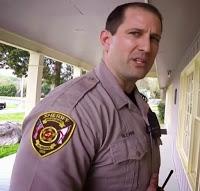
Michael Smirnoff
An Alabama police officer has pleaded guilty to federal criminal charges of violating a man's civil rights by repeatedly assaulting him while he was handcuffed.
The case of former Tallassee officer Michael Smirnoff shows, in some cases, our "federal justice apparatus," takes criminal violations of civil-rights laws seriously and seeks to hold rogue officers accountable. When taken in conjunction with my own case of being beaten and wrongfully arrested by Shelby County deputies inside my own home, the Smirnoff case also shows the feds can look the other way when an instance of police misconduct goes beyond a crooked street cop to include crooked legal and political figures.
The bottom-line question: Why did FBI and U.S. attorney officials in Alabama pursue the Smirnoff case, while (so far) we see no signs that they've done anything on my case. Are Chris Blevins and Jason Valenti -- the Shelby County thugs who unlawfully entered our home, beat me up, doused me with pepper spray, threatened to break my arms, and hauled me to jail for a five-month stay (with no whiff of a criminal allegation) -- supposed to get a free pass? Are Blevins and Valenti protected because their criminal acts were driven by political/legal figures -- likely including attorney Rob Riley, lobbyist Liberty Duke, former Alabama Attorney General Luther Strange, attorney Jessica Medeiros Garrison, U.S. Judge Bill Pryor, and former U.S. Sen. Jeff Sessions (R-AL), among others?
Do the FBI and the U.S. Department of Justice (DOJ) practice a form of white privilege, where bad cops get away with criminal acts if they are committed at the behest of white, conservative political figures? But a thuggish cop gets nailed if he, like Smirnoff, acted essentially as a lone wolf?
Our experience indicates the answer to both questions is yes. It certainly is not because the feds don't know about my case. First, it received national and international news coverage. Second, I contacted two FBI offices in Alabama, and to my knowledge, they've done nothing.
On November 19, 2018, I contacted Susan Hansen, of the Montgomery FBI Office, and told her about my experience in Shelby County with officers Blevins and Valenti. I had read about her involvement with the Smirnoff case, and that's why I contacted her, even though I figured jurisdiction on my case probably would rest in Birmingham. Ms. Hansen took down details about my case and treated me in a professional manner, but as I expected, she said the matter was outside her purview, and it would need to go to the Birmingham office. She said she would pass along the information to her counterpart in Birmingham, Cornelius Harris.

Chris Blevins
I took the extra step of contacting Mr. Harris in Birmingham and leaving a detailed voice message with him. I've never heard from him. Did Mr. Harris ignore my phone message and toss the info from Ms. Hansen in the trash? Did he take a genuine interest in the case, only to have his superiors -- Special Agent in Charge Johnnie Sharp Jr. and U.S. Attorney for the Northern District of Alabama Jay Town -- short-circuit it for political reasons?The answers to those questions are unknown at the moment, but it's clear I was beaten, kidnapped, and incarcerated for political reasons, and it's likely a cover-up is under way for political reasons.
As for Michael Smirnoff, how did he get in trouble? From a report at al.com:
According to the guilty plea, Smirnoff was on duty as an investigator in March 2016 when he used his patrol car to pursue a 24-year-old man who was on a four-wheeler. After the pursuit, the victim stepped off his four-wheeler, laid face down on the ground, and allowed several Tallassee police officers to handcuff him.
While the man was handcuffed, authorities said, Smirnoff lifted him into the air and then slammed him to the ground. Smirnoff then repeated the assault. Moments later, before Smirnoff placed the victim into his patrol car, Smirnoff slammed the victim’s head into the side of the vehicle. For each assault, the victim was handcuffed, compliant, and did not pose a threat, Franklin said.
Smirnoff faces a maximum sentence of 10 years in prison and a $250,000 fine. His sentencing has been set for July 18.
Chris Blevins and Jason Valenti should be facing similar punishment. But it appears they haven't even been investigated. Of course, if powerful figures are pressuring the feds to lay off Blevins and Valenti, that itself is a crime -- obstruction of justice. Those who know about the offense, but have failed to report it to the "proper tribunal" also are committing a federal crime -- misprision of a felony.
Does law enforcement in Alabama take police misconduct conduct seriously, in general, or only in certain cases? Consider these words from Middle District U.S Attorney Louis Franklin and his assistant, Eric Drieband:
“Police officers who willfully use excessive force not only violate the Constitution, they erode the public trust in law enforcement,” Drieband said in a prepared statement.
“It is especially important in a climate of distrust between law enforcement and the public, that officers act ethically and within the bounds of the law,” Franklin said. “This police officer’s brutal behavior was unacceptable and criminal. He violated this young man’s constitutional rights and the trust placed in law enforcement officers to faithfully, ethically, and morally enforce the law. You can be sure that anytime an officer steps over the line and into criminal behavior, as this one did, my office will hold that individual accountable.”
Should the public take those statements seriously or consider them empty words?
